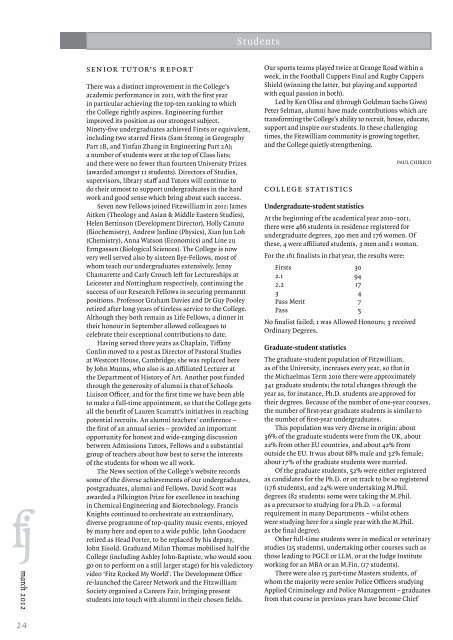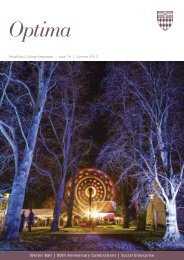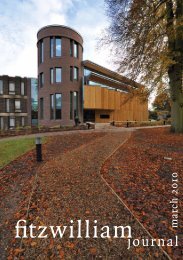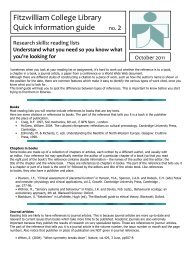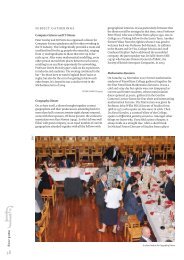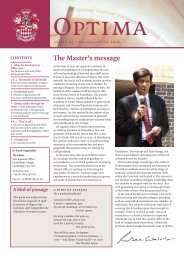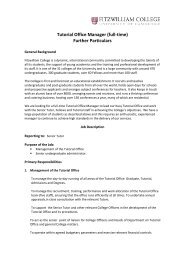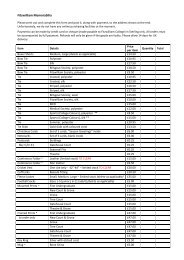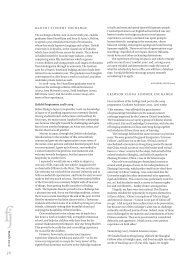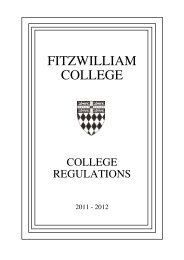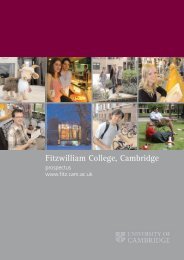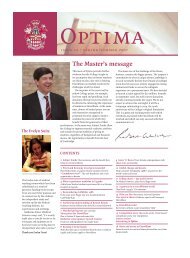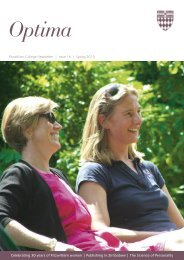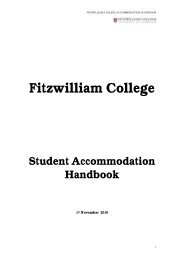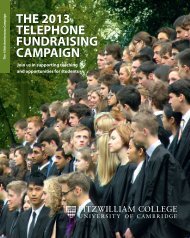Part I - Fitzwilliam College - University of Cambridge
Part I - Fitzwilliam College - University of Cambridge
Part I - Fitzwilliam College - University of Cambridge
You also want an ePaper? Increase the reach of your titles
YUMPU automatically turns print PDFs into web optimized ePapers that Google loves.
march 2012<br />
24<br />
senior tutor’s report<br />
There was a distinct improvement in the <strong>College</strong>’s<br />
academic performance in 2011, with the first year<br />
in particular achieving the top-ten ranking to which<br />
the <strong>College</strong> rightly aspires. Engineering further<br />
improved its position as our strongest subject.<br />
Ninety-five undergraduates achieved Firsts or equivalent,<br />
including two starred Firsts (Sam Strong in Geography<br />
<strong>Part</strong> 1B, and Yinfan Zhang in Engineering <strong>Part</strong> 2A);<br />
a number <strong>of</strong> students were at the top <strong>of</strong> Class lists;<br />
and there were no fewer than fourteen <strong>University</strong> Prizes<br />
(awarded amongst 11 students). Directors <strong>of</strong> Studies,<br />
supervisors, library staff and Tutors will continue to<br />
do their utmost to support undergraduates in the hard<br />
work and good sense which bring about such success.<br />
Seven new Fellows joined <strong>Fitzwilliam</strong> in 2011: James<br />
Aitken (Theology and Asian & Middle Eastern Studies),<br />
Helen Bettinson (Development Director), Holly Canuto<br />
(Biochemistry), Andrew Jardine (Physics), Xian Jun Loh<br />
(Chemistry), Anna Watson (Economics) and Line zu<br />
Ermgassen (Biological Sciences). The <strong>College</strong> is now<br />
very well served also by sixteen Bye-Fellows, most <strong>of</strong><br />
whom teach our undergraduates extensively. Jenny<br />
Chamarette and Carly Crouch left for Lectureships at<br />
Leicester and Nottingham respectively, continuing the<br />
success <strong>of</strong> our Research Fellows in securing permanent<br />
positions. Pr<strong>of</strong>essor Graham Davies and Dr Guy Pooley<br />
retired after long years <strong>of</strong> tireless service to the <strong>College</strong>.<br />
Although they both remain as Life Fellows, a dinner in<br />
their honour in September allowed colleagues to<br />
celebrate their exceptional contributions to date.<br />
Having served three years as Chaplain, Tiffany<br />
Conlin moved to a post as Director <strong>of</strong> Pastoral Studies<br />
at Westcott House, <strong>Cambridge</strong>; she was replaced here<br />
by John Munns, who also is an Affiliated Lecturer at<br />
the Department <strong>of</strong> History <strong>of</strong> Art. Another post funded<br />
through the generosity <strong>of</strong> alumni is that <strong>of</strong> Schools<br />
Liaison Officer, and for the first time we have been able<br />
to make a full-time appointment, so that the <strong>College</strong> gets<br />
all the benefit <strong>of</strong> Lauren Scarratt’s initiatives in reaching<br />
potential recruits. An alumni teachers’ conference –<br />
the first <strong>of</strong> an annual series – provided an important<br />
opportunity for honest and wide-ranging discussion<br />
between Admissions Tutors, Fellows and a substantial<br />
group <strong>of</strong> teachers about how best to serve the interests<br />
<strong>of</strong> the students for whom we all work.<br />
The News section <strong>of</strong> the <strong>College</strong>’s website records<br />
some <strong>of</strong> the diverse achievements <strong>of</strong> our undergraduates,<br />
postgraduates, alumni and Fellows. David Scott was<br />
awarded a Pilkington Prize for excellence in teaching<br />
in Chemical Engineering and Biotechnology. Francis<br />
Knights continued to orchestrate an extraordinary,<br />
diverse programme <strong>of</strong> top-quality music events, enjoyed<br />
by many here and open to a wide public. John Goodacre<br />
retired as Head Porter, to be replaced by his deputy,<br />
John Eisold. Graduand Milan Thomas mobilised half the<br />
<strong>College</strong> (including Ashley John-Baptiste, who would soon<br />
go on to perform on a still larger stage) for his valedictory<br />
video ‘Fitz Rocked My World’. The Development Office<br />
re-launched the Career Network and the <strong>Fitzwilliam</strong><br />
Society organised a Careers Fair, bringing present<br />
students into touch with alumni in their chosen fields.<br />
Students<br />
Our sports teams played twice at Grange Road within a<br />
week, in the Football Cuppers Final and Rugby Cuppers<br />
Shield (winning the latter, but playing and supported<br />
with equal passion in both).<br />
Led by Ken Olisa and (through Goldman Sachs Gives)<br />
Peter Selman, alumni have made contributions which are<br />
transforming the <strong>College</strong>’s ability to recruit, house, educate,<br />
support and inspire our students. In these challenging<br />
times, the <strong>Fitzwilliam</strong> community is growing together,<br />
and the <strong>College</strong> quietly strengthening.<br />
college statistics<br />
PAUL CHIRICO<br />
Undergraduate-student statistics<br />
At the beginning <strong>of</strong> the academical year 2010–2011,<br />
there were 466 students in residence registered for<br />
undergraduate degrees, 290 men and 176 women. Of<br />
these, 4 were affiliated students, 3 men and 1 woman.<br />
For the 161 finalists in that year, the results were:<br />
Firsts 30<br />
2.1 94<br />
2.2 17<br />
3 4<br />
Pass Merit 7<br />
Pass 5<br />
No finalist failed; 1 was Allowed Honours; 3 received<br />
Ordinary Degrees.<br />
Graduate-student statistics<br />
The graduate-student population <strong>of</strong> <strong>Fitzwilliam</strong>,<br />
as <strong>of</strong> the <strong>University</strong>, increases every year, so that in<br />
the Michaelmas Term 2010 there were approximately<br />
341 graduate students; the total changes through the<br />
year as, for instance, Ph.D. students are approved for<br />
their degrees. Because <strong>of</strong> the number <strong>of</strong> one-year courses,<br />
the number <strong>of</strong> first-year graduate students is similar to<br />
the number <strong>of</strong> first-year undergraduates.<br />
This population was very diverse in origin: about<br />
36% <strong>of</strong> the graduate students were from the UK, about<br />
22% from other EU countries, and about 42% from<br />
outside the EU. It was about 68% male and 32% female;<br />
about 17% <strong>of</strong> the graduate students were married.<br />
Of the graduate students, 52% were either registered<br />
as candidates for the Ph.D. or on track to be so registered<br />
(176 students), and 24% were undertaking M.Phil.<br />
degrees (82 students: some were taking the M.Phil.<br />
as a precursor to studying for a Ph.D. – a formal<br />
requirement in many Departments – whilst others<br />
were studying here for a single year with the M.Phil.<br />
as the final degree).<br />
Other full-time students were in medical or veterinary<br />
studies (25 students), undertaking other courses such as<br />
those leading to PGCE or LLM, or at the Judge Institute<br />
working for an MBA or an M.Fin. (17 students).<br />
There were also 15 part-time Masters students, <strong>of</strong><br />
whom the majority were senior Police Officers studying<br />
Applied Criminology and Police Management – graduates<br />
from that course in previous years have become Chief


